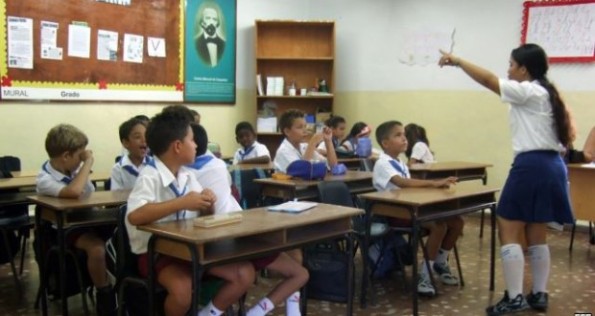 Josuan, 16 years old, a second year high school student, narrowly missed involvement in a notorious fraud case.
Josuan, 16 years old, a second year high school student, narrowly missed involvement in a notorious fraud case.
“A week before the news was published in the newspaper Granma, a fellow classmate and me, we thought about purchasing the math final exam for $12 CUC. It was an open secret that the exam was already circulating around Havana. The tests and grades is normal”, says the student from Havana.
On June 27, the Granma newspaper, Communist Party organ, acknowledged the existence of a massive fraud. A person who works at the printer where the 11th grade exams were reproduced, along with two teachers from the Arroyo Naranjo town, were accused of “removing an exam with lucrative intent”.
According to some students, the tests were being sold for between $10 and $15 CUC. Although the news was highlighted in the official newspaper, school fraud in Cuba is symptomatic. It’s a national epidemic.
Let’s examine the cause of school fraud and its variants. Between 1970-1990, fraud was never a lucrative business. It was a procedure to consolidate and showcase the image that Fidel Castro liked to sell of the Cuban Revolution.
For Castro, success was a question of statistics and numbers. At the beginning of his political discourses, without pause and from memory, he would recite a long list of numbers, attempting to demonstrate that the Revolution was superior to any other government that existed prior to 1959. From the low infant death rate, to the thousands of doctors graduated annually, to the millions of professionals formed “thanks to the Revolution”.
Education was one of the jewels in Castro’s crown. With the objective of maintaining the enchantment of the statistics which were going up, education at all levels lost many integers. The teachers were not judged by the quality of their classes. They were “measured” — a jargon used in those years to indicate the number of students who moved up to the next grade.
It was when the education fell into “passing”. Every year, 100% of the students, perhaps some with serious limitations would move up to the next level. It was then, that the fraud was almost consensual.It was disguised in many ways.
Money was not the reason. The teacher who would police the classroom while the students took the exam would leave them alone for fifteen minutes. Enough time for the students to check their answers with the rest of their classmates.
Sometimes fraud was brazen. A teacher would calmly copy with white chalk the answers on the blackboard. Another way: the day before the exam, a review, the teacher would expose the whole exam to the students.
It was a time in which we were useful numbers to keep Castro’s propaganda afloat. These waters have now been muddied. Cyclically, the official press has denounced notorious cases of fraud, which freely occur in middle and high schools.
With the advent of the “Special Period”, the country got hit with a stagnation economic crisis that has now lasted 22 years. Salaries are now jokes in bad taste. With the loss of value of the Cuban peso, the quality of teaching has fallen even lower. Thousands of teacher left for exile or deserted to better paid trades.
It’s common to see a former teacher selling ice cream or cleaning floors in a five-star hotel. Poverty — with too many teachers without vocation or knowledge — into which public education has now sunk, has caused teachers to use tests in lucrative ways.
This happens from elementary to high school. “For 100 Cuban pesos weekly, the deputy director of a school, reviewed material with the kids before the final exams. On that exam, was all the material she reviewed”, said the father of a student.
But if you want to see fraud in a larger scale, visit the night schools or trade schools. “At the school where I go to get my high school degree, for 5 CUC they sell the final exams. It’s barefaced. If you don’t have money, they accept gifts like a perfume or a Lebron James shirt”, said a young man.
About the gaps in grammar or simple arithmetic of the students who start college, a college professor said: “They come with notable deficiencies. They do not have the basic mathematics knowledge and show major orthographic blunders. Geography or History, before taking the exams, they learn the lessons punctually”.
Those blunders in school education, are one of the signs of thousands of mediocre teachers and professionals. 90% of Cuban doctors that attempt to revalidate their degrees outside the island fail. The same happens with civil or telecommunications engineers.
Cuba is a nation of high educational indices; to talk about quality that’s another thing.
It’s rare for a student born after the Castro Revolution not to have engaged in fraud. If you never did it, raise your hand.
Ivan Garcia
Picture – Taken from Marti News
Translated by – LYD
28 September 2013
